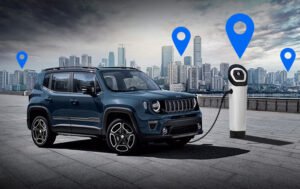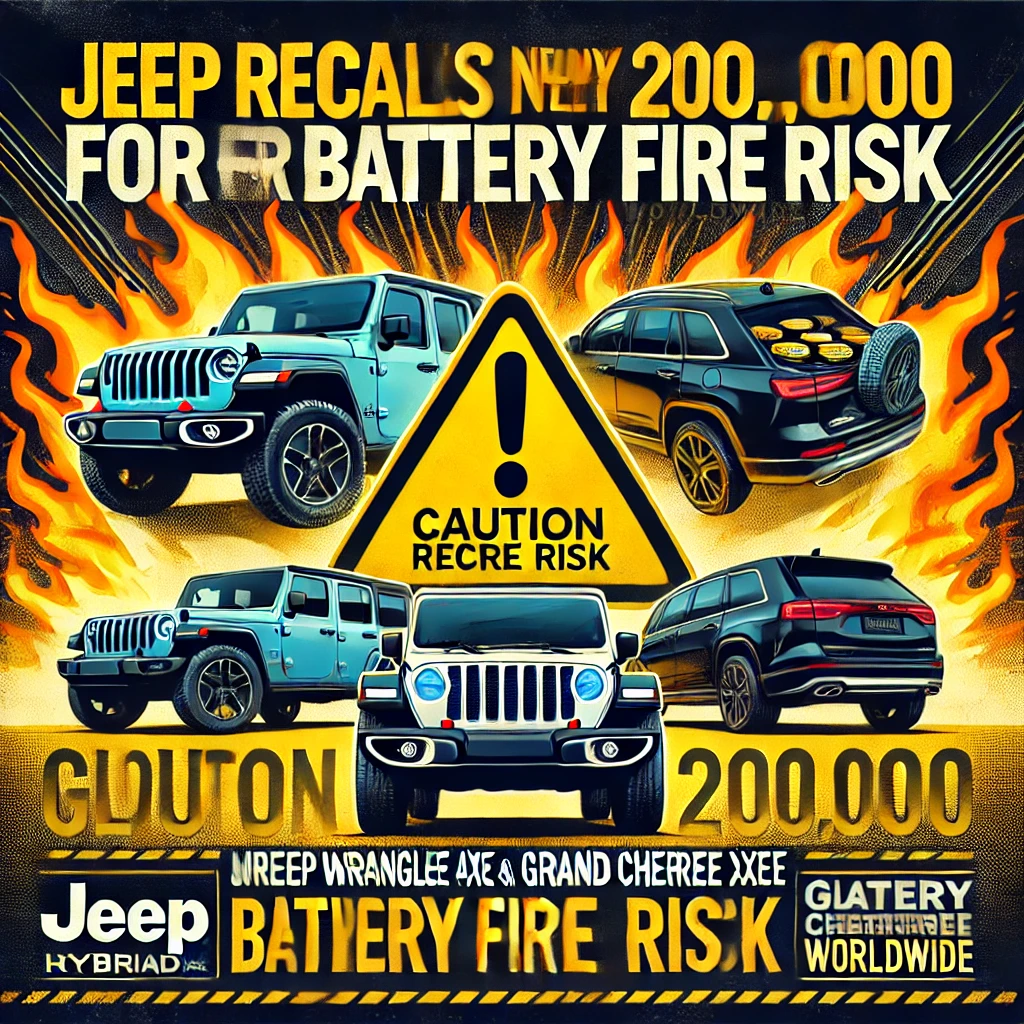Jeep recalls over 65,000 plug-in hybrid electric vehicles (PHEVs), including its popular Wrangler 4xe and Grand Cherokee 4xe models, due to a potential fire risk associated with their high-voltage battery systems. The recall was initiated after Jeep received several reports of thermal incidents, raising concerns over the safety of the vehicles.
The Jeep Recalls Issue : Battery Contamination and Fire Risk
The core of the Jeep Recalls issue lies in the battery packs supplied by a third-party manufacturer. Jeep’s investigation revealed internal contamination within the battery cells, which could lead to short circuits and, consequently, fires. The contamination has caused electrical malfunctions, particularly in high-voltage situations, posing a significant safety hazard. Jeep’s recall is a proactive measure to address this risk before it leads to widespread incidents.
In response, Jeep has urged owners to avoid charging their vehicles and to refrain from using hybrid mode until repairs are made. This recall affects a wide range of vehicles manufactured between 2021 and 2023, prompting Jeep to notify owners and issue instructions for ensuring their vehicles remain safe until they can be inspected.

Models Affected By Jeep Recalls and The Timeline
The Jeep Recalls primarily impacts the Jeep Wrangler 4xe and Grand Cherokee 4xe PHEVs, both of which have gained popularity due to their off-road capabilities and electric powertrains. These vehicles symbolize Jeep’s commitment to electrification, making the recall a significant moment for the automaker as it grapples with the challenges of transitioning to electric vehicles (EVs).
Jeep expects to begin inspecting and replacing the affected batteries in the coming months, with repairs covered under warranty. While no fatalities have been reported, this issue has nonetheless raised concerns about the safety protocols of battery production and quality control. Owners are encouraged to contact their local dealerships to arrange service appointments, as Jeep plans to conduct battery replacements at no additional cost.
Jeep’s Commitment to Safety and Electrification
While this recall could potentially disrupt Jeep’s electrification momentum, the company remains committed to expanding its EV lineup. The brand has taken decisive steps to mitigate the risks posed by the faulty batteries, reaffirming its dedication to safety and customer satisfaction. Jeep’s parent company, Stellantis, has also emphasized that this recall is a necessary step toward maintaining the integrity of its PHEV offerings.
Jeep Recalls highlights the complexity of EV battery production and the need for stringent quality control measures. As automakers like Jeep continue to push the boundaries of electric vehicle technology, safety remains a top priority. Industry analysts are watching closely to see how this recall impacts Jeep’s long-term strategy and its position in the rapidly evolving EV market.
Broader Implications for the EV Industry
This Jeep Recalls underscores a broader issue within the EV industry: the inherent risks associated with high-voltage battery systems. While Jeep is not the first automaker to issue a recall over battery concerns, this situation emphasizes the need for more rigorous testing and development of battery technologies. As the global demand for electric vehicles continues to rise, automakers must balance innovation with safety to ensure long-term success.
The recall also serves as a reminder that the journey to electrification is not without its challenges. Battery technology is advancing rapidly, but issues like those faced by Jeep underscore the importance of continuous improvement and collaboration between automakers and battery suppliers. Moving forward, the industry must prioritize the development of safer, more reliable batteries to meet the growing demand for electric vehicles.

What This Means for Jeep Owners
For Jeep owners, this recall means temporarily adjusting how they use their vehicles. Until the necessary repairs are made, owners of the affected Wrangler and Grand Cherokee 4xe models should avoid charging their vehicles and should not engage hybrid mode. Jeep has assured owners that their vehicles remain safe to drive in gasoline mode, but they should take care to follow the automaker’s recommendations to prevent any safety incidents.
Jeep recalls process is expected to be comprehensive, with inspections and battery replacements starting as soon as possible. In the meantime, the automaker is working closely with its dealerships to ensure that affected customers receive timely service and support.
The Future of Jeep’s Electrification
Despite this setback, Jeep’s electrification strategy remains on course. The company has ambitious plans to introduce more electric models in the coming years, building on the success of the Wrangler 4xe and Grand Cherokee 4xe. As part of Stellantis, Jeep has access to advanced resources and technology, which will help it continue to innovate and develop electric vehicles that meet the needs of modern drivers.
This recall is an important reminder of the challenges facing the EV industry, but it also demonstrates Jeep’s commitment to transparency and customer safety. By addressing this issue head-on, Jeep is taking the necessary steps to ensure that its electrified vehicles remain reliable and safe for consumers.
Conclusion
Jeep recalls of over 65,000 PHEVs due to potential battery fire risks is a significant development for the automaker as it navigates the challenges of electrification. While the recall may cause temporary disruption, Jeep’s proactive approach ensures that safety remains a top priority. As the EV market continues to grow, this recall serves as a reminder of the importance of quality control and the ongoing need for innovation in battery technology. Jeep’s response, alongside its commitment to sustainability and safety, reinforces its position as a leading player in the electrified vehicle space.
